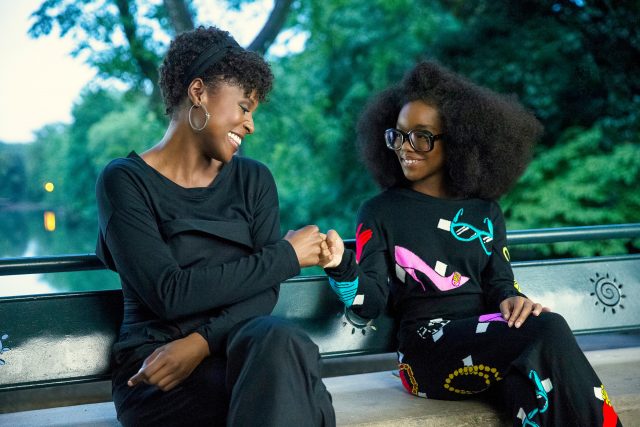Little: A Minor Achievement, by David Bax

Tina Gordon wrote the screenplay for this year’s What Men Want, a gender- and race-swapped version of Nancy Meyers’ What Women Want. Now Gordon has written and directed Little, a gender-, race- and age-swapped version of Penny Marshall’s Big. This time around, there is no credit for the writers of the original so it seems it’s different enough not to qualify as an adaptation. Still, we all know what we’re looking at here. Gordon seems to know it, too, opening the movie with Skee-Lo’s “I Wish,” a nod both to the prologue’s 1990s setting and to the famous line from Marshall’s movie, “I wish I were big.”
Regina Hall is Jordan Sanders, a successful Atlanta businesswoman who overcame a childhood of bullying to found and run a sort of tech incubator developing apps and games. Issa Rae is April, her assistant, who suffers daily abuse, in and out of work hours, from her demanding boss. April may enjoy the company of the local doughnut vendor’s nerdy, magic-obsessed daughter (Marley Taylor) but Jordan offers her only insults, earning herself a wave of a wand and a wish that she would be little enough for the young girl to cut down to size. The next morning, Jordan awakens in the body of her thirteen-year-old self (Marsai Martin) and must enlist April’s help to not only return to her adult form but also to keep the company afloat.
Little doesn’t borrow its broad strokes from Big alone. There are plenty of other cliches on hand, including the ostensibly broke April living in a loft apartment that rivals her boss’s for luxury but that is in keeping with the movie’s commonplace but still disappointing preoccupation with materialism and conspicuous consumption. There’s also a musical number, a trope borrowed from the neighboring romantic comedy genre that would be welcome if well-executed but that arrives out of nowhere and exits just as awkwardly.
Hall and Rae live up to their reputation as proven comedic talents and there are welcome bit turns from Saturday Night Live vets Rachel Dratch and Mikey Day. But far too much of the comedy is left in the hands of actors, mostly those playing Jordan’s employees, who aren’t up to the task. Studio comedies generally live and die by their supporting casts—Marshall certainly knew that—but Gordon lets the jokes fall flat in puddles of Central Casting flop sweat.
Little stumbles as a comedy but finds much more success as a social issue satire in ways both broadly trumpeted and more subtle. It’s sad to note that the movie’s unapologetic blackness still feels daring today but Gordon goes even further in her skewering of clueless white privilege when Day’s silver spoon kid relates his background as a, ahem, self-made millionaire. Unfortunately, the majority of Little’s progressive cred is squandered when Jordan makes some transphobic comments near the film’s beginning. These are, to be clear, spoken by Hall’s Jordan, who is supposed to be a bad person but the tenor of the scene plays like we’re supposed to be on her side, as if she’s just saying what we’re all thinking (we’re not).
Uncomfortable in a more positive way is the movie’s sexual content. Big had fun with its lead’s budding but still directionless horniness. In this case, though, Jordan is a mature, experienced woman even after she turns into a teenager. The fact that her thirst doesn’t diminish when her physical maturation does may cause some to squirm. But when April and young Jordan bond over their shared attraction to men, it’s not just a subtextual acknowledgment that teenage girls have sexual desires but also a depiction of confident black women with sexual appetites. Too often in the history of cinema, such women would be dangerous. Showcasing them in a family-friendly studio comedy is almost revolutionary. Just think how potent it would be if the movie were good.






























